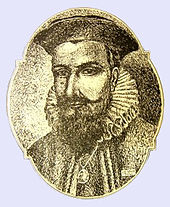Hernando de Lerma

Don Hernando de Lerma (born November 1, 1541 in Lerma , south of Burgos , Spain, † around 1591 in Madrid ) was a lawyer, politician, conquistador and founder of the provincial capital Salta in northwest Argentina . Its picture in history remains contradictory due to the sources.
Life
On November 13, 1577, Philip II , King of Spain, appointed him governor of the Gobernación del Tucumán in the northwest of what is now Argentina. His assumption of office was delayed by two years because he did not have the necessary financial means to equip himself and his company for the trip to his official residence in Santiago del Estero . He did not reach this until June 16, 1580 after he had asked the royal administration in Potosí (Bolivia) for a credit for his trip.
When he arrived in Santiago del Estero, he immediately had his predecessor, Gonzalo de Abreu , arrested and thrown in prison and tortured on charges of unlawful enrichment in office. Abreu died in 1581 as a result of torture.
Hernando de Lerma also came into conflict with the bishop's delegate, Dean Francisco de Salcedo , whom he received in a friendly manner in his house, but immediately involved in a dispute over the legality of their titles Deán and Licenciado . The quarrel turned into enmity, in which Lerma prevailed. Francisco de Salcedo withdrew sick to a convent in Esteco , but was tracked down by Lerma and imprisoned.
Lerma had been commissioned by the Viceroy of Peru, Francisco de Toledo , to found a city north of Santiago del Estero to secure the communication routes in the Gobernación del Tucumán. With 70 Spaniards from Santiago del Estero and accompanied by pacified Indians, he set out on April 3, 1582 and decided to found the city in the Valle de Salta . On the one hand for strategic reasons, because he suspected that there would be better control of the hostile Indian peoples Calchaquíes and Humahuaca , on the other hand because the location between the newly founded port cities in Santiago de Chile , Callao in Peru and Buenos Aires seemed suitable to him.
Salta was founded on April 16, 1582 in the open field near the Río Arenales as Ciudad de Lerma en el valle de Salta . Lerma distributed the building sites for the Cabildo , the cathedral and the first citizens of the city during the founding act . Lerma himself returned to Santiago del Estero, where he met increasing resistance.
On November 6, 1583, the higher authority, the Real Audiencia de Charcas , sent Francisco Arévalo Briceño to Santiago del Estero to investigate the increasing number of complaints against Lerma's administration. In the course of the investigation, Lerma was arrested in 1584 and charged in Chuquisaca . However, Lerma appealed to the Council of India , the highest court of justice, and was sent back to Madrid, where he remained in prison and died without a final verdict on his case.
meaning
For the historian Paul Goussac , “Lerma's term in office was nothing but a series of criminal attacks”. And the Baltic historian Armando Bazan describes Lerma as "as malicious as a disease".
When assessing Lermas, however, it should be taken into account that the majority of historical testimony to his person comes from representatives of the Catholic Church, Lerma's main opponents during his tenure. Lerma fought against the power of the church and it had in him a serious, university-educated opponent, a rarity in the time of the first Spanish conquerors. There are suspicions that he was a Marrano - a converted Jew who still secretly adhered to his faith - who, in his political position, tried to protect his fellow believers on American soil. As a lawyer, he was also able to effectively defend himself against allegations by the Church.
Web links
- Hernando de Lerma, biography (Spanish)
- Hernando de Lerma, biography (Spanish)
| personal data | |
|---|---|
| SURNAME | Hernando de Lerma |
| BRIEF DESCRIPTION | Spanish conquistador, governor of the Gobernación del Tucumán (1577–1582) |
| DATE OF BIRTH | November 1, 1541 |
| PLACE OF BIRTH | Lerma , Spain |
| DATE OF DEATH | 1591 |
| Place of death | Madrid , Spain |

